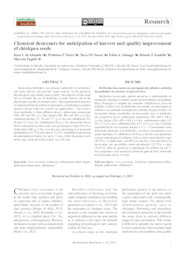Chemical desiccants for anticipation of harvest and quality improvement of chickpea seeds.
Chemical desiccants for anticipation of harvest and quality improvement of chickpea seeds.
Author(s): ALMEIDA, I. L. de; VIEIRA, W. F.; SOUZA, N. O.; SUINAGA, F. A.; AMABILE, R. F.; FAGIOLI, M.
Summary: ABSTRACT Desiccating herbicides can promote uniformity of maturation, and early harvest and provide improvements in the physical, physiological, and sanitary seeds quality. The objective of this work was to evaluate the use of herbicides in early harvest and in the physiological quality of chickpea seeds. The experimental design was of randomized blocks with four replications, considering a complete factorial design with one control (no application) + two factors (four herbicides x three different doses): glufosinate-ammonium (200, 400 and 500 g a.i./ha); diquat (200, 400 and 500 g a.i./ha); carfentrazoneethyl (15, 30 and 37.5 g a.i./ha) and saflufenacil (49, 98 and 122.5 g a.i./ha). Saflufenacil (49 g a.i./ha) showed the lowest harvest anticipation (4 days) and a low percentage of vigor (50.25%). Glufosinate (400 g a.i./ha), was the most promising as it increased germination to 83.75% and vigor to 78.25%, in addition to promoting the anticipation of harvest by up to 17 days, while the normal cycle of the crop, observed in the control, was 154 days.
Publication year: 2023
Types of publication: Journal article
Unit: Embrapa Cerrados
Keywords: Cicer Arietinum, Dessecante, Grão de Bico, Herbicida, Plant Science, Semente, horticulture, soil science
Observation
Some of Embrapa's publications are published as ePub files. To read them, use or download one of the following free software options to your computer or mobile device. Android: Google Play Books; IOS: iBooks; Windows and Linux: Calibre.
Access other publications
Access the Agricultural Research Database (BDPA) to consult Embrapa's full library collection and records.
Visit Embrapa Bookstore to purchase books and other publications sold by Embrapa.

